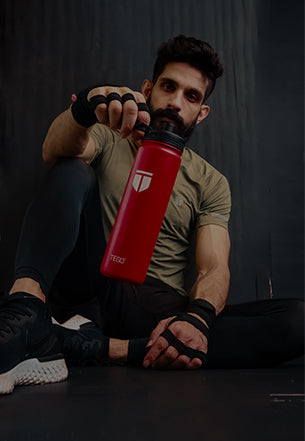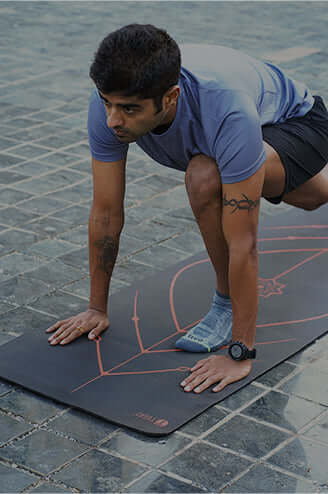Meet Harshvardhan Joshi, a 24-year-old engineering graduate who dreams high – 8,848 meters above sea level. With over 40 high-altitude expeditions under his belt, Harsh has made Mount Everest his next mission. He is an outlier, who is passionate about renewable energy, and will be climbing the highest peak with solar panels to create awareness on the subject.
One look at his Instagram handle @TravelWithHarsh will give you an insight into his grit and out of the box thinking. Case-in-point: when his Everest expedition planned for summer 2020 got halted due to the pandemic, he used his time to complete a solo, self-sufficient IRONMAN 70.3 distance triathlon!
We’ve gotten to know Harsh well over the past year and caught up with him just before he left for his expedition; here are excerpts from our conversation:
1. How and when did you start trekking and mountaineering?
At the age of 15, I started assembling and selling computers. And that is how I made friends with some doctors, who bought a computer from me. They were active - used to cycle and trek - and it is with them that I first got exposure to outdoors and hiking. They took me to the Tungareshwar Wildlife Sanctuary and thus began my exposure and love for the outdoors. I quickly realised that I had potential and love for activity, be it cycling, running or trekking. Till date, running remains my favourite activity because of its simplicity and benefits.
In 2015, I saw a post on Facebook about a trek that caught my attention. I found out more about that trek and others and soon booked my first Himalayan trek. Since most of my peers either did not get permission to go for a trek at that age or did not have the resources, I decided to go solo. With guidance from my doctor friends I was well prepared with gear and knowledge. The trek was for 7-8 days long but I spent a month in Uttarakhand and my love for mountains began from there. There was no looking back after that. With guidance from my same friends (who had been to the Everest Base Camp) and others that I met along the way I got to know about the mountaineering courses and went on to do many more treks in the Himalayas.

2. What made you switch from being an engineering student to adventure tourism professional?
I graduated from engineering college in 2017 and through my college life I went for treks or mountaineering courses in between semesters. By this time my family had also noticed my passion for mountaineering and were supportive of my evolution as an athlete and mountaineer.
After graduation I began to prepare for MBA, appearing for exams such as CMAT, NMAT and CAT. I even qualified for some colleges. During this time I spoke to my friends who were already in MBA schools and they all encouraged me to instead peruse something in the outdoors since I was so passionate about it. They said an MBA can wait, do what you love.
So I decided to spend more time backpacking and spent most of 2017 and 2018 climbing and gaining experience. Since I was spending so much time in the mountains I would often guide people during a trek just out of passion and sometimes to help pay for my trip. I also took foreign tourists up Stok Kangri - an over 6,000 meter peak in the Trans-Himalayan region.
Apart from leading treks I also interned briefly at a Mumbai-based travel company where I used to curate local hikes and soon became a consultant for some companies, creating experiences and doing recce, given my passion for research and finding new trails.
I have taken some risks with my education, taking breaks in college to climb, but for now my expedition to Mount Everest is my MBA. I would however like to study more in the future.
3. You are in your early twenties and while your peers are pubbing and clubbing in metros you've devoted years to connecting with the hills. Do you ever miss the hustle-bustle and society of metros?
I do not miss it too much. During school and college I enjoyed the student life and used to socialise and party with my friends. After college many of my friends left town for higher studies and jobs. So I am now trying to create a circle of like-minded people that are active and enjoy outdoors. I try to motivate others to take up running and realise the benefits, this is how I hope to create a community and social circle of active people.
My days are usually busy with training, meetings and my fundraiser. In my spare time I read and I am also learning French. I do still meet my friends and enjoy socialising once in a while, though it is harder to relate to city people. I now get a different high from running, trekking and swimming. The adrenaline rush and endorphins keep me going back for more. I quit alcohol 3 years ago for discipline but I am looking forward to having a drink after the Everest expedition to celebrate!
4. What has your mountaineering journey been like? What all peaks have you climbed so far?
It has been a very enriching journey so far. From being an average engineering student to taking up activities such as skiing, kayaking and mountaineering and realising my potential to now getting close to realising my dream of climbing Mount Everest – it’s been surreal!
I have learnt a lot over the years and met interesting people who have all added to my journey. Be it the mountaineering courses or climbing various Himalayan peaks it has been marked with lots of self-discovery.
Over the years I have done 9 courses including Search & Rescue Mountaineering Course, Advanced Skiing, WMI USA Wilderness First Responder, Advanced Mountaineering Course, Basic Mountaineering Course and Mountaineering Instructor Course. All these have helped me conquer many peaks in the Himalayas and prepare for my upcoming Everest expedition. Some of the peaks that I have climbed include: Stok Kangri, Mt Deo Tibba and several 5,000 to 7,000 meter peaks in the Himalayas.
5. Tell us about the Sangharsh Mission Mount Everest.
The word Sangharsh means to struggle and this is about my journey to conquer Mount Everest. My own Sangharsh, from 0 meters above sea level in Maharashtra to 8,848 meters above sea level in the Himalayas.
While I am climbing Mount Everest for my passion, I wanted to do something to add value to it. So I picked a cause close to my heart – sustainable development. Renewable energy is very important in the wake of global warming and climate change and solar power can help solve a lot of issues.
The aim is to light up Himalayan village homes in India and Nepal with solar power and highlight the benefits – reduced electricity bills and carbon offset.
I am also raising funds for my Everest expedition since it is a costly trek – you need at least USD 50,000 to climb Mt. Everest even in the most minimal manner. At this age, I cannot bear the cost independently and people have come out in my support. You can follow my journey on my website: www.sangharsh.co

6. What is your daily routine like as you prepare for the climb?
I follow a structured plan by UpHill Athlete specifically for Everest. It is a scientific plan that measures vitals and coaches monitor performance to make sure athletes train smart. Every day of the week is different. My week consists of 2 hikes - one uphill and one long hike, two runs - one flat run and one trail/recovery run and 2 days of strength and core training. I also swim 4 days a week. So apart from Monday, I do two workouts each day. I swim for fun and because I enjoy triathlons.
In fact, the Everest expedition was planned for 2020 but had to be postponed due to the pandemic. I used that time to complete a solo, self-supported IRONMAN 70.3 distance triathlon. After that I resumed my training for mountaineering.
I try to use the best gear as it is pertinent to have quality gear, as a result I own gear from all over the world that I have reviewed and tested. The technical skills I learnt in the mountaineering courses add a lot to my knowledge and planning for Everest.
7. Which has been your most challenging climb? Is there any particular incident that you would like to share?
This is a funny story in retrospect. I was climbing Mt Himlung Himal, a 7,126 metre mountain in Nepal. The idea was to test my body and gear ahead of the Everest expedition. Now this mountain is known for giving climbers frost bites. A tough mountain to summit, only 472 people had successfully climbed till 2019. The success ratio is far less than even Mt Everest.
While 1 in 4 climbers lose some extremity during the climb, all those in my group had to undergo a surgery, I had a frozen nose! Despite taking precautions to keep my toes and fingers warm, my nose was badly frost bitten. I had to be flown out, thanks to my insurance for a free chopper ride, else I would have lost my nose. I was lucky that I was able to recover.
Mt Himlung Himal has been the most fun but challenging climb till date and an experience that I won’t forget.

8. What does the future hold for Harsh Joshi? Given the chance and the means, what are things you would like to check off your bucket list?
Everest is just the start, I look forward to climbing many more peaks around the world and in India. I want to keep doing interesting things be it climbing Kanchenjunga or K2, participating in trail races or competing in more triathlons. I also have a travel bucket list, be it Antarctica, Alaska or South America.
I would also like to explore and climb lesser known peaks in India. There is so much to explore and experience in the Himalayas and I hope to really discover the region in the future. I hope to raise the standard of adventure tourism in India with improved experiences, safety and conduct matching international standards.
On the personal front, I will definitely get back to academics and would like to go study in the US or Canada for higher education. I am writing a book on my Everest expedition and the journey leading to it and hope it will help me attain a scholarship. But I will continue to look for other interesting challenges along the way.








